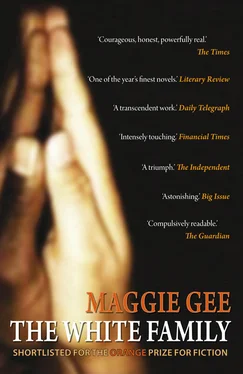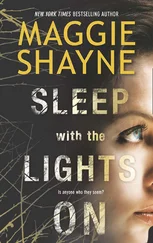She still wasn’t used to Viola and Delorice, their edge of resentment, their sass, their chill, the suspicion in their eyes when they looked at her, so different from the warmth of her African friends.
But Africans were different, as Kojo had explained in the long-ago days when Shirley knew nothing. Africa was very big and very old, and in some ways white people had barely touched it. Things were very different for Caribbeans. Was it surprising if they hadn’t forgotten?
‘Shirley, darlin’,’ said Sophie, hugging her briskly with one thin black arm. ‘We miss you las week, dear. Come sit by me. Go way, Elroy, you too big to be kissin’ your mummy that way,’ laughing, showing two gold teeth, one of which Elroy had recently paid for.
On the stage below, spot-lit, smiling, looking round the church with a contented air, were the usual group, the Reverend Lack in his ‘casual smart’ blue foam-backed blazer and knife-creased flannels, and on the chairs behind him, two other white men of around the same age, in safari suits worn over careful shirt and tie, plus Leah, a handsome middle-aged black woman, whose role in the service was mostly smiling, and praying, arms upraised, with statuesque dignity. On her right were the singers and musicians with their mikes, the sax glinting like a golden treble clef.
And then the Reverend Lack welcomed them, and the music came up, and the singing rose, and the half-dozen television monitors dotted around the church flickered into life, deep indigo, and upon them the words of the gospel songs began to lift them and move them together, as people started swaying, as people started clapping and smiling at each other, as a young mixed-race woman to one side started dancing, rhythmically, sensually, without the self-absorption of sex, her head held high, her face shining, smiling, her hands held up in celebration, and then at least half the congregation were dancing, and Shirley began to move as well, her hips loosening, slowly, and her stiff white shoulders, and Sophie’s hand was tucked through her arm, she was at least five inches smaller than Shirley but when Sophie danced she bobbed up to her nose, singing in a pure, slightly cracked soprano, smiling and looking round in approval at what was happening elsewhere in the church, perhaps also to receive the approval of others, for church, Elroy said, was where she was happiest, where she felt accepted in this country at last. (But the Church of England hadn’t made her welcome, the church she had hoped would be her home. A hurt from fifty years ago, never forgotten.)
This singing, this dancing always touched Shirley deeply, the feeling that they were all together in a perfectly simple, bodily way, all of them equal in God and the music, jackets and coats coming off as they moved — Let them praise His name with dancing, for the Lord takes delight in His people.
Hard to believe, in that ringing temple, that black and white people feared each other.
They sang the refrains again and again, but they weren’t like the choruses they sang at St John’s, a rigid tag after every verse. Here they sang words again because they were moved to, they sang them again to go with the feeling, Let His grace … fall … here, Let His grace … fall … here , and as they sang, she could feel grace falling, she felt grace fall upon her heart, upon her hands, which she lifted to the sky, upon her hopes, upon all their futures. Death would pass; it would pass away, and hatred, and prejudice, all pass away, for those who hated must surely get tired, lay down their heavy burden and rest, For today … is the day … of the Latter Rain …
Viola’s hands were lifted as she danced, such elegant hands with glossy red nails and the rings her departing husband had given her, leaning towards the platform below, and she flashed a sudden smile across at Shirley, as if she saw what they were doing was absurd but wasn’t it also something fine?
Shirley didn’t like the Reverend Lack, for all his thick hair and easy smile. He was British, born in Kenya, as he often reminded them, probably the son of missionaries, but his inflections were American, and his style of preaching seemed learned, not natural. He won their attention with rhetorical tricks, with sudden dramatic raisings of his voice, with appeals to the congregation for assent and approval — ‘Amen, brothers?’ (though most of them were sisters) ‘Amen, brothers?’ until they gave him back an ‘Amen’, appeals that sometimes seemed unconfident but sometimes almost bullying, especially as he primed them for the offertory song, telling them God would bless the givers tenfold, practically promising their money back. It didn’t seem right to pressure them so much, when so many of the congregation were poor, but the bag came round, a capacious bag, and Shirley slipped in a note, and tried not to think how much Elroy was giving.
Then the Reverend Lack continued. He had been given a word. ‘Brothers, I have been given a word …’ He was often given words, and would shout his words at the congregation, suddenly, emphatically, yelling them into the microphone, disconnected words he used like bullets, ‘Order’ was one, ‘Order, ORDER,’ and ‘Revival’ was another, ‘Revival, REVIVAL,’ and he was saying Britain was ripe for revival, that revivals were beginning everywhere, that together they could carry the word across the land, but the words fell like shotgun pellets on her ears, she was still very tired from the night before, and her mind strayed away to Thomas and Elroy, Order , ORDER, revival , REVIVAL …
Then a police siren howling in the street outside brought her up with a start, completely awake, cold sweat on her forehead and her palms.
It was death she thought of then, and disorder. Sudden, brutal. The thief in the night. What if her father had died last night? (Was it right between them? Had they made it right? His last words were ‘You’re a good girl, Shirley.’ Dad, she thought. I wish I had said — ‘It’s all right, Dad. It’s all right, now. I know you tried. The rest doesn’t matter.’ When it gets to the end, the rest doesn’t matter . She hadn’t said it; she said it now, her lips moving slightly, talking to him, sending a message to her earthly father, because time seemed short, everything felt fragile.) What if that screaming police car had killed her? — Where were the police cars rushing off to?
Sophie was sitting, deaf to the sermon, writing requests for prayers on the green cards supplied for the purpose. She always completed at least a dozen cards, which sometimes seemed faintly comic to Shirley, as Sophie sat through the sermon oblivious, frowning with concentration as she wrote, putting on and then removing her glasses. It was as if she was determined to get value from the church, and the value, to her, was the prayers and the singing and the feeling that here at least she was at home. She had left her old home so long ago, and Britain hadn’t given her what it had promised, but she kept on writing in her spidery hand; here she was at home again, here she was happy. Every Sunday she was welcomed, respected.
Now Elroy was whispering to his mother. ‘Why Winston not here again?’
‘I jus callin’ Winston name to the Lord. He not come home again las night. I tink he got himself a girlfriend at las, now we have to pray she a good gyal, Elroy …’
‘That boy deserve some licks for not letting you know.’
‘You watch your mouth in church, Elroy King.’
The sermon continued, now louder, now softer, its peaks as deafening as Shirley’s memories of Alfred shouting when she was little. The Reverend Lack leaned forward and thundered, ‘For we have to be ready to fight, brothers and sisters. We shall have to fight for the souls of the people. Great times are coming, wonderful times, times of renewal, times of revival … We shall see again the glory days of the Welsh Revival of the 1920s. All of us will have to stand up and be counted. Then it will not be enough to drink, to come and drink of the waters of life. Every one of us will have to go forth. There will be a new Battle of Britain, brothers and sisters. A Battle of Britain. And we are His Army. This is the word I am given today. Amen? Amen … I give you a new Battle of Britain …’
Читать дальше












